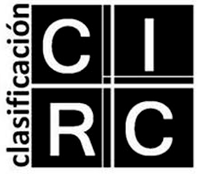
History of the journal
During the 12th Congress of the Association of Historians of Communication held in May 2012 at the Universitat Pompeu Fabra in Barcelona, the creation of the RiHC. Revista internacional de Historia de la Comunicación took shape as an independent scientific research publication with exclusive on-line edition, promoted by the AsHisCom, although not conceived as an organ of the Association which maintains its own website and means of internal communication. The RiHC aims to provide a forum for the History of Communication in all of its facets and specialities. Issues are published every 6 months and are open to those historians of communication or researchers in this field, whether they are members of the Association or not, who offer quality scientific work subject to the evaluation of recognised independent experts.
The scope of scientific journals on communication has widened considerably in the past two decades both in Spain and in Latin America, to a great extent thanks to the increase in the number of faculties and centres with studies in communication. However, their number remains low in comparison with other areas of the social sciences and humanities, and those oriented specifically towards the History of Communication are very scarce, For this reason, we believe that RiHC can contribute to this field by offering historians of communication in any of its aspects, the number of which is visibly growing, a platform which seeks rigour in its contents, welcomes innovation and widens our knowledge of the evolution of communication, currently still full of gaps, of inadequacies, if not simply of errors that are admitted and sustained precisely because of the lack of concrete and rigorous research.
The response to the call, before the release of the first issue, was enormously generous, with over twice as many proposals as expected, in different languages, and displaying a significant level of research. This confirmed the idea that we would be able to offer a publication that in a short time may be included in the main databases and rankings in both the European and Latin American scientific community.
The Editorial Board welcomes opinions, criticisms and suggestions in order to improve the journal in coming editions. Several thematic dossiers are already being considered for future issues, as well as the gradual creation of new sections, documentaries and sources.












